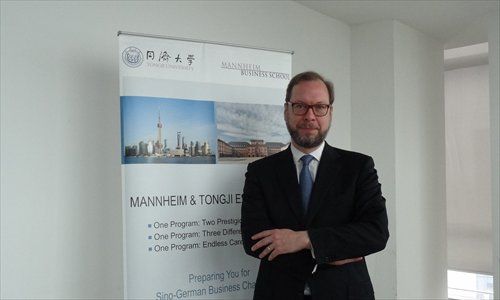A Sino-German approach to MBA education
The Executive Master of Business Administration degree (EMBA) program jointly run by Shanghai's Tongji University's School of Economics and Management and Mannheim Business School from Germany celebrated last Thursday the graduation of their third class of students as well as their incoming fourth class.
As a young program with only a few years in the Chinese market, this unique EMBA has developed strengths in combining a classical MBA studies with a strong Sino-German focus. It provides a world-standard education to general managers in the field of finance, marketing, accounting and operations, integrated with the challenges of operating in a Sino-German business environment. The program awards a Chinese degree and a German degree. On average, the work experience of its students is 11 years.
Presiding over the dual graduation and opening ceremony of the Tongji Mannheim EMBA program was president of Mannheim Business School, Professor Jens Wüstemann, who shared with the Global Times his views on an internationalized MBA education.
GT: How do you feel about the cooperation between Mannheim and Tongji? Have there been any major achievements and challenges in its EMBA program?
Wüstemann: Tongji and Mannheim are cooperating in many fields of business education, from bachelor and master education to multiyear research. Regarding the EMBA program, it is always a little risky to bring new MBA programs to a competitive market. But we designed it very carefully, listened to the needs of the business community, and we are pleased to announce our third graduation. Our students have a great deal of experience and leadership from a variety of fields and industries. Forty percent of the students are from Germany; 40 percent from China, and the remaining are from the rest of the world.
GT: You have taught many Chinese senior managers and business leaders in the EMBA course. What do you think are the strengths of Chinese leaders, and what are their weaknesses?
Wüstemann: They are eager to learn, they have excellent skills, and they are very motivated. They want to change the world, so they have the right mind-set. I have to say that "weakness" is the wrong word, but if I could think of some opportunities for improvement, they could be a bit more creative in class. China in general is becoming more innovative, and you can see this in a lot of industries. So instead of following ideas, Chinese leaders should strive to develop new ideas.
GT: How can the EMBA program help them with this?
Wüstemann: A good MBA program such as ours provides opportunities in class and out in the real world for students to test ideas, to discuss ideas, and to exchange views with professors and corporate partners. We have many case studies based on being innovative, and offer a module dedicated to innovation.
GT: In your classes, what are the differences between Chinese students and the German students?
Wüstemann: I believe that in our globalized society, there are no 'Chinese students' or 'German students.' Having said this, we are all the result of cultural influences. Therefore, there exist cultural differences, such as in character and mind-sets. But there are also many similarities between the Chinese and Germans. Students from both countries seem to be extremely eager to learn. Many have strong engineering or mathematics backgrounds. The industries in both our countries are also quite comparable.
GT: Why would a German choose to study an EMBA program in China?
Wüstemann: Students who work in multinational firms, such as SAP, BASF and Bosch, know that the Asian market, particularly China and especially Shanghai, provides incredible business opportunities. They want to be prepared. Our program is a solution for this. It is also a great opportunity to earn a degree from such a prestigious university as Tongji.
GT: What do you think should be further integrated into international education programs such as the EMBA?
Wüstemann: We just discussed this Wednesday with the School of Economics and Management at Tongji University. Developing in the field of digitalization is a challenge to all multinational firms, so we want to become one of the first programs to offer digitalization in a Sino-German context. We are also thinking about designing modules from different disciplines that combine technologies and business content.

Professor Jens Wüstemann, president of Mannheim Business School
Photo: Yang Lan/GT